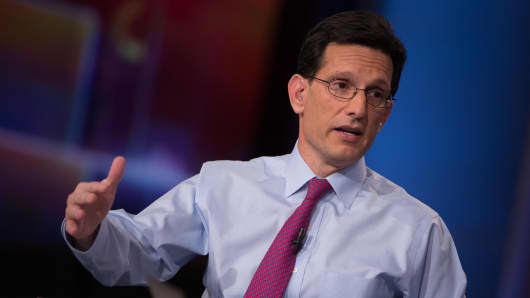With the possible exception of Bernie Sanders, who has argued that economic growth should take a back seat to redistributing wealth from the top one-percent, one thing it seems every candidate for president – Republican and Democrat – agrees on is the need to significantly boost economic growth. While it is easy to agree on the goal, it is much tougher to produce a policy platform to actually achieve the objective.
The non-partisan Congressional Budget Office estimates that between now and 2040 the U.S. economy will grow an average of just 2.2 percent a year. That is significantly below the 3.1 percent average rate of growth of the past few decades.
Tune in to CNBC's "Squawk Box" on Thursday at 7am. Eric Cantor will be a guest, talking about the GOP debate.





